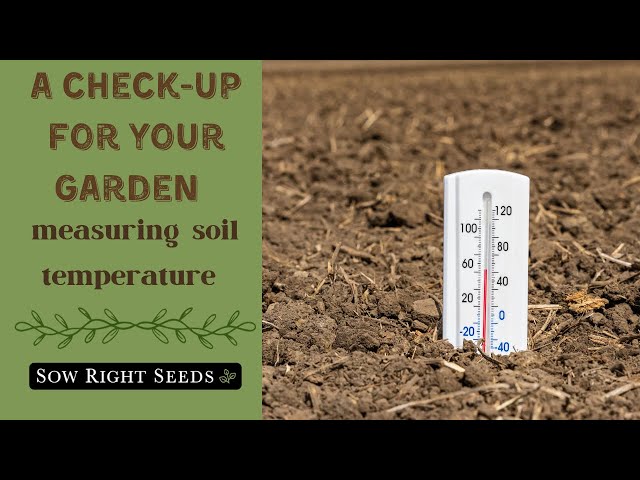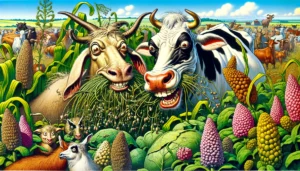
soil temperature.jpg

Soil Temperature
Soil temperature refers to the thermal condition of the soil, influenced by factors such as solar radiation, air temperature, soil moisture, and organic matter content. It plays a crucial role in regulating biological processes, nutrient availability, and plant growth in agricultural systems.
Definition:
Soil temperature represents the degree of heat energy present within the soil matrix, affecting chemical, physical, and biological processes, including seed germination, microbial activity, nutrient mineralization, and root growth.
Fall off the barn roof and busted your keister? Life on the farm or ranch can be tough on the bum. Need a break? Laugh it off at FarmerCowboy.com, the #1 farm humor site. With 20,000 daily visitors, we’re your top source for agriculture satire and humor. Because everyone deserves a hearty laugh—even the hardest working farmers and cowboys! Join us and turn those long days into fun tales at FarmerCowboy.com.
Factors Influencing Soil Temperature:
- Solar Radiation: Incoming solar energy warms the soil surface, influencing soil temperature dynamics, diurnal temperature fluctuations, and seasonal variations.
- Air Temperature: Atmospheric temperature affects soil temperature through convective heat transfer, with warm air heating the soil surface and cold air cooling it.
- Soil Moisture: Moist soils have higher heat capacity and conduct heat more effectively than dry soils, moderating soil temperature fluctuations and influencing thermal conductivity.
- Organic Matter Content: Organic matter acts as an insulating layer, reducing soil temperature extremes and buffering temperature fluctuations, particularly in surface soils.
- Soil Texture: Soil texture influences thermal properties, with sandy soils heating and cooling more rapidly than clayey soils due to differences in particle size and pore space.
Effects of Soil Temperature:
- Seed Germination: Optimal soil temperatures are essential for seed germination, with each crop species having specific temperature requirements for germination and early growth.
- Root Growth: Soil temperature affects root growth and development, with warmer soils promoting root elongation, nutrient uptake, and water absorption, contributing to overall plant vigor.
- Microbial Activity: Soil temperature influences microbial metabolic rates, with warmer temperatures accelerating decomposition, nutrient cycling, and organic matter turnover, enhancing soil fertility.
- Nutrient Availability: Soil temperature regulates soil nutrient transformations and availability, with microbial-mediated processes such as nitrogen mineralization and phosphorus solubilization being temperature-dependent.
- Plant Phenology: Soil temperature governs plant phenological events, including flowering, fruiting, and dormancy, influencing crop development, yield potential, and harvest timing.
Measurement and Monitoring:
- Soil Thermometers: Insertion or surface thermometers measure soil temperature at various depths, providing insights into temperature gradients and seasonal fluctuations.
- Data Loggers: Automated data loggers record soil temperature at predetermined intervals, allowing for continuous monitoring and analysis of temperature trends over time.
- Remote Sensing: Satellite imagery and thermal sensors detect surface temperature patterns across landscapes, providing spatial information for soil temperature mapping and analysis.
References:
- United States Department of Agriculture. (n.d.). Soil Temperature. Retrieved from https://www.nrcs.usda.gov/wps/portal/nrcs/detail/national/soils/health/aeration/
- Soil Science Society of America. (2021). Soil Temperature: Implications for Agriculture and Environment. Retrieved from https://www.soils.org/discover-soils/soil-basics/soil-physical-properties/soil-temperature
- Food and Agriculture Organization of the United Nations. (2008). Soil Temperature. Retrieved from http://www.fao.org/3/Y4303E/y4303e07.htm
Originally posted 2008-03-28 11:37:32.
Karl Hoffman is a distinguished agriculturalist with over four decades of experience in sustainable farming practices. He holds a Ph.D. in Agronomy from Cornell University and has made significant contributions as a professor at Iowa State University. Hoffman’s groundbreaking research on integrated pest management and soil health has revolutionized modern agriculture. As a respected farm journalist, his column “Field Notes with Karl Hoffman” and his blog “The Modern Farmer” provide insightful, practical advice to a global audience. Hoffman’s work with the USDA and the United Nations FAO has enhanced food security worldwide. His awards include the USDA’s Distinguished Service Award and the World Food Prize, reflecting his profound impact on agriculture and sustainability.




